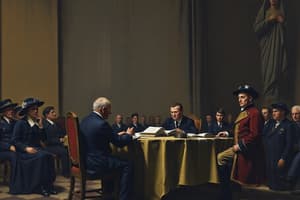Podcast
Questions and Answers
What was the primary goal of the League of Nations, established in 1920 as part of the Treaty of Versailles?
What was the primary goal of the League of Nations, established in 1920 as part of the Treaty of Versailles?
To promote international cooperation and prevent future wars
What was the amount of reparations forced upon Germany by the Treaty of Versailles, and what was the repayment schedule?
What was the amount of reparations forced upon Germany by the Treaty of Versailles, and what was the repayment schedule?
132 billion gold marks, with interest, to be paid from 1921-1932
What were the key grievances that contributed to German resentment towards the Treaty of Versailles?
What were the key grievances that contributed to German resentment towards the Treaty of Versailles?
War guilt clause, reparations, and territorial losses
What was the policy of appeasement, and what were some notable examples of its implementation?
What was the policy of appeasement, and what were some notable examples of its implementation?
What was the main criticism of the League of Nations, and how did this limitation impact its effectiveness?
What was the main criticism of the League of Nations, and how did this limitation impact its effectiveness?
How did the Treaty of Versailles contributed to the rise of the Nazi Party in Germany?
How did the Treaty of Versailles contributed to the rise of the Nazi Party in Germany?
What was the significance of the Munich Agreement, and what did it represent for the policy of appeasement?
What was the significance of the Munich Agreement, and what did it represent for the policy of appeasement?
How did the Treaty of Versailles and the subsequent policy of appeasement ultimately contribute to the outbreak of World War 2?
How did the Treaty of Versailles and the subsequent policy of appeasement ultimately contribute to the outbreak of World War 2?
Flashcards are hidden until you start studying
Study Notes
Treaty of Versailles and World War 2
League of Nations
- Established in 1920 as part of the Treaty of Versailles
- Aimed to promote international cooperation and prevent future wars
- Key features:
- Collective security: member states would collectively defend against aggression
- Mandates: League would oversee former German colonies and territories
- Disarmament: reduction of military forces and armaments
- Criticisms:
- Lack of military power to enforce decisions
- Ineffective in preventing Japanese invasion of Manchuria (1931) and Italian invasion of Ethiopia (1935)
- Failed to prevent German remilitarization of the Rhineland (1936)
Reparations
- Germany forced to pay significant reparations to Allied Powers (France, Britain, etc.)
- Amount: 132 billion gold marks (approximately $33 billion USD)
- Payment schedule: 1921-1932, with interest
- Consequences:
- Weakened German economy, contributing to hyperinflation and widespread unemployment
- Fostered resentment among Germans, who felt unfairly punished
German Resentment
- Treaty of Versailles seen as unfair and humiliating by many Germans
- Key grievances:
- War guilt clause: Germany forced to accept responsibility for causing the war
- Reparations: seen as excessive and unjust
- Territorial losses: loss of Alsace-Lorraine to France and Saar to League of Nations
- Rise of nationalist and militarist sentiments in Germany, contributing to the appeal of Nazi Party
Appeasement Policy
- Policy adopted by Britain and France in the 1930s to avoid war with Germany
- Key features:
- Giving in to German demands to avoid conflict
- Hoping to satiate German aggression and prevent further expansion
- Examples:
- Remilitarization of the Rhineland (1936): Britain and France failed to respond
- Anschluss with Austria (1938): Britain and France did not intervene
- Munich Agreement (1938): Britain and France allowed Germany to annex Sudetenland in Czechoslovakia
- Criticisms:
- Emboldened Hitler's aggression, leading to further expansion and eventually war
- Failed to prevent the outbreak of World War 2
Treaty of Versailles and World War 2
League of Nations
- Established in 1920 as part of the Treaty of Versailles to promote international cooperation and prevent future wars
- Featured collective security, where member states would defend against aggression, and mandates to oversee former German colonies and territories
- Aimed to reduce military forces and armaments through disarmament
- Criticized for lacking military power to enforce decisions and failing to prevent Japanese invasion of Manchuria (1931) and Italian invasion of Ethiopia (1935)
- Failed to prevent German remilitarization of the Rhineland (1936)
Reparations
- Germany forced to pay 132 billion gold marks (approximately $33 billion USD) to Allied Powers (France, Britain, etc.)
- Reparations were scheduled to be paid from 1921-1932 with interest
- Weakened German economy, contributing to hyperinflation and widespread unemployment
- Fostered resentment among Germans, who felt unfairly punished
German Resentment
- Treaty of Versailles seen as unfair and humiliating by many Germans
- Germans felt unfairly punished by the war guilt clause, excessive reparations, and territorial losses
- Loss of Alsace-Lorraine to France and Saar to League of Nations contributed to resentment
- Rise of nationalist and militarist sentiments in Germany, contributing to the appeal of Nazi Party
Appeasement Policy
- Policy adopted by Britain and France in the 1930s to avoid war with Germany
- Involved giving in to German demands to avoid conflict
- Hoped to satiate German aggression and prevent further expansion
- Failed to respond to remilitarization of the Rhineland (1936) and Anschluss with Austria (1938)
- Allowed Germany to annex Sudetenland in Czechoslovakia through the Munich Agreement (1938)
- Emboldened Hitler's aggression, leading to further expansion and eventually war
- Criticized for failing to prevent the outbreak of World War 2
Studying That Suits You
Use AI to generate personalized quizzes and flashcards to suit your learning preferences.




